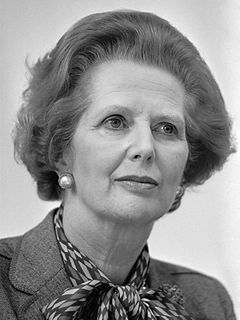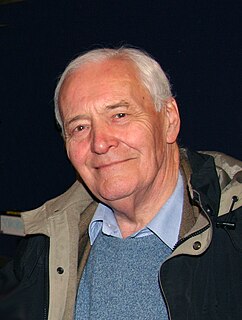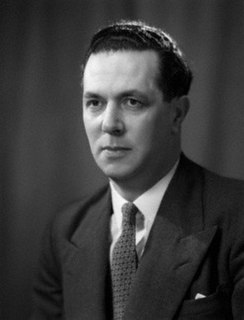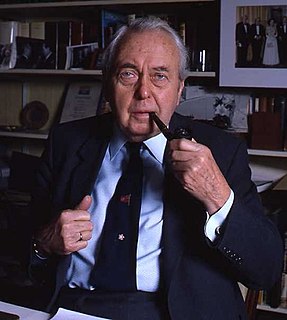
Roy Harris Jenkins, Baron Jenkins of Hillhead, was a British politician who served as President of the European Commission from 1977 to 1981. At various times a Member of Parliament (MP) for the Labour Party, Social Democratic Party (SDP) and the Liberal Democrats, he was Chancellor of the Exchequer and Home Secretary under the Wilson and Callaghan Governments.

Leonard James Callaghan, Baron Callaghan of Cardiff,, commonly known as Jim Callaghan, was a British politician who served as Prime Minister of the United Kingdom from 1976 to 1979 and Leader of the Labour Party from 1976 to 1980. Callaghan is the only person to have held all four Great Offices of State, having served as Chancellor of the Exchequer from 1964 to 1967, Home Secretary from 1967 to 1970 and Foreign Secretary from 1974 to 1976. He was a Member of Parliament (MP) from 1945 to 1987.

Thatcherism is a form of British conservative ideology named after Conservative Party leader Margaret Thatcher. The term has been used to describe the principles of the British government under Thatcher from the 1979 general election to her resignation in 1990, and continuing into the Conservative governments under John Major and David Cameron. Proponents of Thatcherism are referred to as Thatcherites.

Anthony Neil Wedgwood Benn was a British politician, writer and diarist who served as a Cabinet minister in the 1960s and 1970s. A member of the Labour Party, he was Member of Parliament for Bristol South East and Chesterfield for 47 of the 51 years between 1950 and 2001. He later served as President of the Stop the War Coalition from 2001 to 2014.

Hugh Todd Naylor Gaitskell was a British politician who served as Leader of the British Labour Party and Leader of the Opposition from 1955 until his death in 1963. An economics lecturer and wartime civil servant, he was elected to Parliament in 1945 and held office in Clement Attlee's governments, notably as Minister of Fuel and Power after the bitter winter of 1946–47, and eventually joining the Cabinet as Chancellor of the Exchequer. Facing the need to increase military spending in 1951, he imposed National Health Service charges on dentures and spectacles, prompting the leading left-winger Aneurin Bevan to resign from the Cabinet.

The Winter of Discontent was the period between November 1978 and February 1979 in the United Kingdom characterised by widespread strikes by private, and later public, sector trade unions demanding pay rises greater than the limits Prime Minister James Callaghan and his Labour Party government had been imposing, against Trades Union Congress (TUC) opposition, to control inflation. Some of these industrial disputes caused great public inconvenience, exacerbated by the coldest winter in 16 years, in which severe storms isolated many remote areas of the country.

Denis Winston Healey, Baron Healey, was a British Labour politician who served as Chancellor of the Exchequer from 1974 to 1979 and as Secretary of State for Defence from 1964 to 1970; he remains the longest-serving Defence Secretary to date. He was a Member of Parliament from 1952 to 1992, and was Deputy Leader of the Labour Party from 1980 to 1983. To the public at large, Healey became well known for his bushy eyebrows, his avuncular manner and his creative turns of phrase.

Black Wednesday occurred on 16 September 1992 when the UK Government was forced to withdraw sterling from the European Exchange Rate Mechanism (ERM), after a failed attempt to keep its exchange rate above the lower limit required for the ERM participation. At that time, the United Kingdom held the Presidency of the Council of the European Union.

Hilary James Wedgwood Benn is a British Labour Party politician who has been the Member of Parliament (MP) for Leeds Central since a by-election in 1999. He served in the Cabinet from 2003 to 2010, under both Tony Blair and Gordon Brown. He also served as Shadow Foreign Secretary from 2015 to 2016 and as Chairman of the Brexit Select Committee from 2016 to 2021.

Keith Sinjohn Joseph, Baron Joseph,, known as Sir Keith Joseph, 2nd Baronet, for most of his political life, was a British politician, intellectual and barrister. A member of the Conservative Party, he served as a minister under four prime ministers: Harold Macmillan, Sir Alec Douglas-Home, Edward Heath and Margaret Thatcher. He was a key influence in the creation of what came to be known as "Thatcherism".

Charles Anthony Raven Crosland was a British Labour Party politician and author. A social democrat on the right wing of the Labour Party, he was a prominent socialist intellectual. His influential book The Future of Socialism (1956) argued against many Marxist notions and the traditional Labour Party doctrine that expanding public ownership was essential to make socialism work, arguing instead for prioritising the end of poverty and improving public services. He offered positive alternatives to both the right wing and left wing of the Labour Party.

The United Kingdom European Communities membership referendum, also known variously as the Referendum on the European Community , the Common Market referendum and EEC membership referendum, took place under the provisions of the Referendum Act 1975 on 5 June 1975 in the United Kingdom to gauge support for the country's continued membership of the European Communities (EC) — often known at the time as the European Community and the Common Market — which it had entered two-and-a-half years earlier on 1 January 1973 under the Conservative government of Edward Heath. The Labour Party's manifesto for the October 1974 general election had promised that the people would decide through the ballot box whether to remain in the EC.

Peter David Shore, Baron Shore of Stepney, was a British Labour Party politician and former Cabinet Minister, noted in part for his opposition to the United Kingdom's entry into the European Economic Community. His idiosyncratic left-wing nationalism led to comparison with the French politician Jean-Pierre Chevènement. He was described in an obituary by the Conservative journalist Patrick Cosgrave as "Between Harold Wilson and Tony Blair, the only possible Labour Party leader of whom a Conservative leader had cause to walk in fear" and, along with Enoch Powell, "the most captivating rhetorician of the age".
The soft left is a faction within the British Labour Party. The term "soft left" was coined to distinguish the mainstream left of Michael Foot from the hard left of Tony Benn.

Eric Samuel Heffer was a British socialist politician. He was Labour Member of Parliament for Liverpool Walton from 1964 until his death. Due to his experience as a professional joiner, he made a speciality of the construction industry and its employment practices, but was also concerned with trade union issues in general. He changed his view on the European Common Market from being an outspoken supporter to an outspoken opponent, and served a brief period in government in the mid-1970s. His later career was dominated by his contribution to debates within the Labour Party and he defended the Liverpool City Council.

The Labour Party governed the United Kingdom of Great Britain and Northern Ireland from 1974 to 1979. During this period, Harold Wilson and James Callaghan were successively appointed as Prime Minister by Queen Elizabeth II. The end of the Callaghan ministry was presaged by the Winter of Discontent, a period of serious industrial discontent. This was followed by the election of Conservative leader Margaret Thatcher in 1979.

Bernard Donoughue, Baron Donoughue is a British Labour Party politician, academic, businessman and author.
Tory! Tory! Tory! is a 2006 BBC Television documentary series on the history of the people and ideas that formed Thatcherism told through the eyes of those on the New Right. It was nominated for the best Historical Documentary at the Grierson Awards in 2006. The name is based on the 1970 Pearl Harbor war film Tora! Tora! Tora!

The 1976 sterling crisis was a currency crisis in the United Kingdom. Inflation, a balance of payments deficit, a public spending deficit, and the 1973 oil crisis were contributors.
Robin Murray was an industrial and environmental economist. As a social entrepreneur, he advocated and implemented new forms of production and organization, based on principles of ecological sustainability, social justice, and democracy. He developed his thought through practical projects and experiments. A common thread throughout his work was how collaboration, rather than competition, could be a driving force behind economic development and provide the foundation for non-exploitative and egalitarian societies.
















